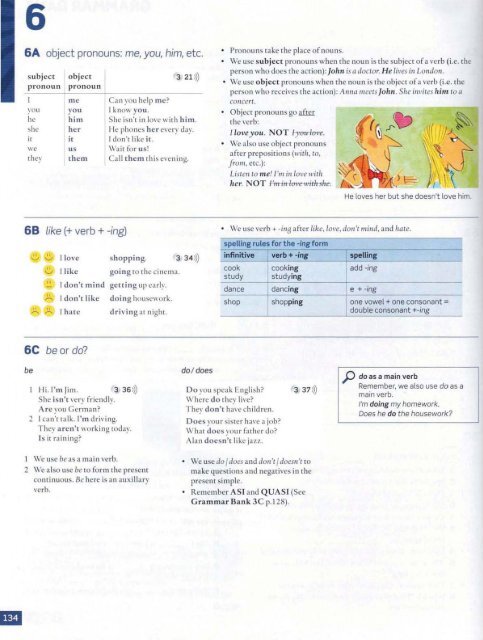o_19fn4c6fp1rt4114p1t6imfs1spia.pdf
You also want an ePaper? Increase the reach of your titles
YUMPU automatically turns print PDFs into web optimized ePapers that Google loves.
6<br />
6A object pronouns: me, you, him, etc.<br />
subjccl object<br />
pro no un pronoun<br />
3 211»)<br />
me C lIl you hel p me?<br />
you ),ou J kllo\\ you.<br />
I" him She i ~ n'( in lovc with him.<br />
she he< He phones her evcry day.<br />
;, ;,<br />
I don"! like it.<br />
we 0' Wail for u s!<br />
t h c~ them Call1hcm Ihis e\'ening.<br />
Prono uns lake Ih (> place o f nouns.<br />
We use s ubject pronouns when the noun is the subject ora \'crb (Le. the<br />
person who does the action): Jo"" is a doelor. He lives ill LOlldoll ,<br />
We use object pro nouns when the no un is the o bject of a verb (i.e. the<br />
person who receives rhe act ion): AIl1I11 meeu ) a/lll . She ill1'ites "i". 1011<br />
cOllccr/ .<br />
Object pronouns go afu:.r<br />
the \'crb:<br />
l io"(' ),011 . NOT Iymrfot't:.<br />
• We also use object pro nouns<br />
after prepositions (lI'ilh , /0 .<br />
f rom. etc.):<br />
U SICII /0 me! I 'm iu/oI'e wilh<br />
her, NOT f!tn-irt-101"t"11-f'h-m~<br />
He loves her but she doesn·t love him,<br />
68 like (+ verb + -ing)<br />
• We use vcrb + -i1l8 a ft er lik e. IDI·e, dO Il'1 milld. and hale.<br />
~ " ~ " I love shopping. 3 3 4 »)<br />
~ " I like going to the ci nema .<br />
" I don't mind gCllingupearl y.<br />
~ " I don't like doing housework .<br />
~ " ~ " , hare driving at night.<br />
spelling rules for the ·ing form<br />
cook<br />
study<br />
dance<br />
shop<br />
l cooking<br />
studying<br />
dancing<br />
shopping<br />
spelling<br />
add ·ing<br />
e + ·;ng<br />
-<br />
one vowel + one consonant -<br />
double consonant +-ing<br />
1<br />
6e bear do?<br />
be<br />
HLI'm Jim. 3 36 »)}<br />
She is n't vcry fri endly.<br />
Are YOII German?<br />
2 J ca n't talk. I'm driving.<br />
The}' aren't working today.<br />
Is it raining?<br />
do/does<br />
Do you spea k Engli sh?<br />
Where do they li\'c?<br />
Thcy don't ha\·echildrcn.<br />
Does your sister have a job?<br />
What does your father do?<br />
Alan does n't li ke j:l'l.z.<br />
3 37»)<br />
P do as a main verb<br />
Remember. we also use do as a<br />
main verb.<br />
"m doing my homework.<br />
Does he do the housework?<br />
1 \Ve use lJeas a main \·erb.<br />
2 We also use be to form the prese ll!<br />
continuous. Be here is an auxiliary<br />
vcrb,<br />
We use dofdoes and dO li', fdoeslI'lto<br />
make questions and negatives in the<br />
present sim ple.<br />
Remember ASI and QUASI (Sec<br />
G rammar Bank 3C 1'.128).



